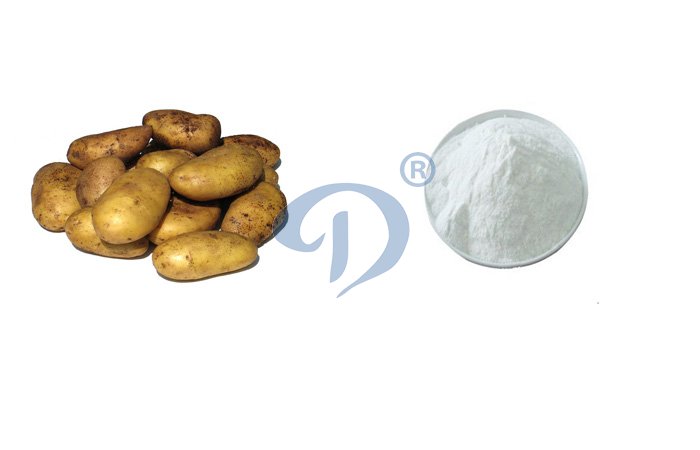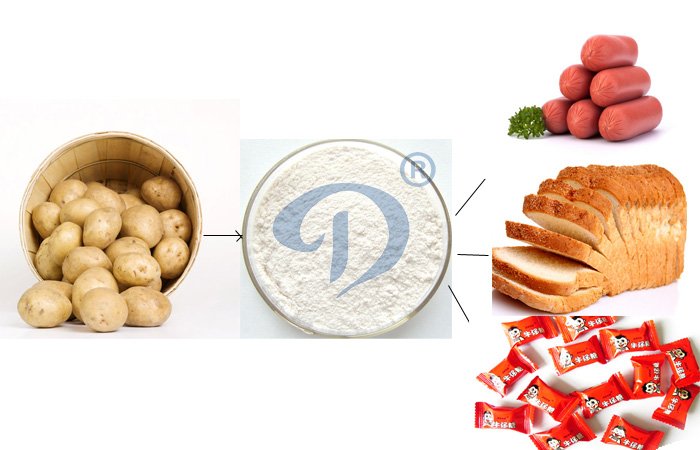Applications of potato starches ?

Potato starch
Potato starch introduction
Potato starch – also known as potato flour – is extracted from potatoes. The cells of the root tubers of the potato plant contain starch granules (leucoplasts). To extract the starch, the potatoes are crushed and the starch grains are released from the cells. The starch is then washed out and dried to powder. Potato starch has been produced in the same basic way for centuries – actually even the ancient Incas knew how to make potato starch.
Potato starch contains typical large oval spherical granules; their size ranges between 5 and 100 μm. Potatoes’ starch granules are roughly twice as big as other starch granules (tapioca or grain starches) resulting in much higher water absorption capacity and better texture. Potato starch is a very refined starch, containing minimal protein or fat. This gives the flour a clear white colour, and the cooked starch typical characteristics of neutral taste, good clarity and transparency, high binding strength, long texture and a minimal tendency to foaming or yellowing of the solution.
Potato starch contains approximately 800 ppm phosphate bound to the starch; this increases the viscosity and gives the solution a slightly anionic character, a low gelatinisation temperature (approximately 60 °C) and high swelling power. These typical properties are used in food and technical applications.
Untreated starch requires heat to thicken or gelatinize. When a starch is pre-cooked, it can then be used to thicken instantly in cold water. Pre-gelatinized potato starch is starch cooked and then dried on a drum dryer or in an extruder making the starch cold water soluble. This is a physical modification of the starch. The starch remains a native starch and can be declared as such. Aloja Starkelsen SIA produces drum-dried pre-gelatinized or cold-swelling potato starch. Chemically modified starches are not allowed in organic food processing.

Potato starch applications
Potato starch applications
As an additive for food processing, food starches are typically used as thickeners and stabilizers in foods such as puddings, custards, soups, sauces, gravies, pie fillings, and salad dressings, and to make noodles and pastas. Potato starch may be used in all traditional recipes replacing any other starch – and in most cases giving better functionality. Organic potato starch adapts extremely well to organic processing.
Potato starch is used as:
Water binder
Thickener
Anti caking ingredient
Bulking ingredient
Glueing agent
The most popular application areas are in:
Meat industry
Bakeries
Confectionery
Dry blends
Potato starch and potato starch derivatives are used in many recipes, for example in noodles, wine gums, cocktail nuts, potato chips, hot dog sausages, bakery cream and instant soups and sauces, in gluten-free recipes, in kosher foods for Passover and in Asian cuisine. In pastry, e.g. sponge cake, it is used to keep the cake moist and give a soft texture. It is also occasionally used in the preparation of pre-packed grated cheese, to reduce sweating and binding. Helmipuuro, traditionally consumed in Finland, is a porridge made from monodisperse grains of potato starch and enjoyed with milk.
Fresh dairy spreads…
Fresh dairy desserts and ice cream…
Fruit preparations…
Cured meats and poultry…
Bread and pastry…
Snacks…
Native starch requires heat to thicken or gelatinize. When a starch is pre-cooked, it can then be used to thicken instantly in cold water. This is referred to as a cold-swelling (CS) or pregelatinized starch.
contact us
- Do you want to buy machine?
- Yes, I want to buy machine
- No, I want to learn more in advance.
- What is your raw material?
- Cassava
- Potato
- Sweet potato
- Other:
- What is the final product you want to produce?
- Chips
- Flour
- Starch
- What is the final product you want to produce?
- Garri
- Cassava flour
- Cassava starch
- Cassava chips
- Attiekie
- Bammy
- Other:
- What is your planned capacity for final product?
- <1 ton per day
- 1 ton per day
- 2 tons per day
- 3 tons per day
- 3-10 tons per da
- 10-20 tons per day
- >20 tons per day
- What is the usage of your cassava chips?
- Food usage (like fried chips, flour)
- Industrial usage (like animal feeds, ethanol)
- What is your planned capacity for final product?
- <5 ton per hour
- 5-10 tons per hour
- >10 tons per hour
- What is your planned capacity for final product?
- <500 kg per hour
- 0.5-5 ton per hour
- 5-10 ton per hour
- >10 ton per hour
- What is your planned capacity for final product?
- <300 kg per hour
- 300-1000 kg per hour
- 1-5 ton per hour
- 5-10 ton per hour
- >10 ton per hour

 Call us
Call us Chat online
Chat online
